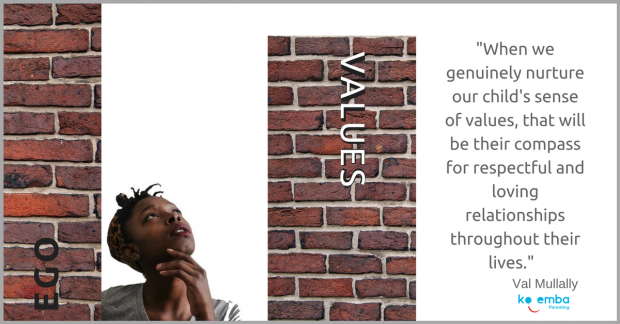If you want to know why good manners matter for your kids – and what to do about it, then read on because I’m going to share with you a recent “AHA” moment I had about Parenting and raising children with good manners.
My Big “Aha” About Children and Good Manners
In this past week, my mind was mulling over the topic of “Kids and Bad Manners” for this blog, when I posted a Facebook Live about “World Values Day”. Suddenly I saw something I’d never seen before.
Here it is:
If manners was a ladder, many parents have their ladder leaning against the wrong wall. They might be ‘well up’ on the manners ladder – but if it’s against the wrong wall, it’s not going to be any help at all.
# LADDER 1 – leans against the “Ego Wall”

You see, our manners ladder is often leaning against the Ego Wall. Ego is self-centred, so the motivation for good manners is,
“Will people think I am a good parent?”
“Will people think I have a well-mannered child?”
If this is my focus, getting my children to have good matters, means it’s really all about me – not about what my child genuinely needs to thrive and grow to be a caring, compassionate and responsible person. (Confession: I’ve been there and done that, even though I couldn’t have recognised it at the time).
# LADDER 2 – leans against the “Values Wall”.
So here is my “AHA!”
The manners ladder that will genuinely make life smoother and happier, leans against the Values Wall. Manners matter because they help us, as a society, to live by what we cherish.

Integrity, inclusivity, courage, empathy, caring, learning, compassion, courtesy, health, authenticity, respect, kindness, patience, responsibility and gratitude are all building blocks of the Values Wall.
We help an elderly person with their shopping, because of our values.
We give up our seat on the bus for a pregnant woman because of our values.
We chew our food with our mouths closed because of our values.
We say “Please” and “Thank you” because of our values.
What Has This Got To Do With Teaching Our Children Good Manners?
My “AHA” moment was a recognition that when we try to teach our children good manners, if our ladder is leaned against the Ego Wall, we will be trying to impose a behaviour.
Perhaps like me, there have been times when you unthinkingly demeaned your child, in your attempt to impose “correct” behaviour on them.
“Eat properly!”
“Don’t interrupt!”
“Say, ‘Thank you’!”
Often these orders leave our children feeling embarrassed, upset, misunderstood and unhappy because it’s likely that when we said these things, we were not modelling patience, kindness, empathy or caring. We weren’t modelling our values.
And wouldn’t you agree, there is a natural alignment between these values and emotions of well-being like joy, peace and contentment. When our motivation for encouraging good manners is based on our values, rather than our self-centred Parent Ego, we are likely to intuitively find ways to helpfully guide our children.
Here’s my “AHA”:
When we genuinely nurture our child’s sense of values, that will be their compass for respectful and loving relationships throughout their lives.

Before you jump in to correct a child’s manners, pause and check whether you are coming from a place of ego or are you making a values-based intervention, that encourages values like kindness, gratitude and compassion.
Manners isn’t a flippant topic. It’s the foundation of healthy society.
Did my “Aha” moment strike a chord with you? Perhaps it brought back memories of times when “good manners” was inflicted on you, leaving you with sad, unhappy or angry memories. We can’t change the past but we can change the future. Let’s help our children have Values based manners – that will naturally be GOOD for all of us. For practical tips see my blog on the Mykidstime website “7 Simple Ways To Help Your Child Develop Good Manners”.
What question, or what one thought, have you taken from this post? We’d love to hear from you. Add your comment below.



No comments yet.